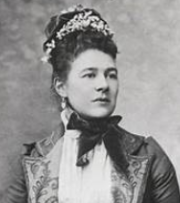Notre Histoire
MANDAT ET BRÈVE HISTOIRE
Le Conseil National des Femmes du Canada (CNFC) est une organisation de longue date dédiée à l'amélioration de la vie des femmes, des familles et des communautés à travers le Canada. Fondé en 1893 par Lady Ishbel Aberdeen, le CNFC est à l'avant-garde de la défense des droits des femmes et des enjeux sociaux depuis plus d'un siècle.
À propos de Lady Ishbel Aberdeen
Lady Aberdeen fut une réformatrice sociale pionnière et la force motrice derrière la fondation du Conseil national des femmes du Canada (CNFC). Elle a utilisé son influence et son dévouement pour unir les femmes de tout le pays afin de travailler ensemble sur des enjeux touchant la société, en particulier les droits et le bien-être des femmes et des enfants. Malgré la résistance de la société et les défis de son époque, Lady Aberdeen a défendu la cause du leadership et de l’autonomisation des femmes.
Principales réalisations de Lady Aberdeen
- A fondé en 1893 le Conseil national des femmes du Canada, créant ainsi une plateforme nationale pour la défense des droits des femmes.
- A joué un rôle essentiel dans la création de l’Ordre des infirmières victorien (VON), favorisant le développement des soins infirmiers professionnels et l’accès aux soins de santé au Canada.
- A soutenu le développement de la Société d’aide à l’enfance, améliorant les initiatives de protection et de bien-être des enfants.
- A plaidé pour l’amélioration de la santé des femmes, de l’éducation et des services sociaux.
- A influencé la législation et les politiques qui ont fait progresser les droits des femmes et la justice sociale.
- A encouragé la collaboration entre les organisations féminines afin de renforcer leur voix collective.
Liens avec le VON et la Société d’aide à l’enfance
Le leadership de Lady Aberdeen s’est étendu au-delà du CNFC. Grâce à son engagement :
- Elle a contribué au lancement de l’Ordre des infirmières victorien (VON), offrant des services infirmiers communautaires essentiels, notamment aux femmes et aux enfants vivant dans les régions rurales et mal desservies.
- Elle a joué un rôle déterminant dans le soutien au développement de la Société d’aide à l’enfance, favorisant la protection et les soins des enfants vulnérables à travers le Canada.
La mission du CNFC se concentre sur plusieurs domaines clés, notamment la santé, l'éducation, les soins aux aînés, les arts et la culture, l'environnement, l'économie, les droits humains fondamentaux et le statut des femmes. Grâce à un engagement actif et à un processus démocratique de développement de résolutions et d'adoption de politiques, l'organisation s'efforce de créer de meilleures opportunités et de sensibiliser par l'action et l'implication communautaire.
La structure du Conseil est complète, englobant des conseils nationaux, provinciaux et locaux de femmes, ainsi que des organisations indépendantes et des membres individuels. Ce vaste réseau permet au CNFC de traiter un large éventail de questions et de plaider en faveur de politiques, de lois et de services qui profitent aux femmes et à la société dans son ensemble. L'organisation utilise diverses méthodes pour atteindre ses objectifs, notamment la formulation de résolutions, l'organisation de pétitions, la réalisation d'enquêtes, l'initiation de campagnes de lettres et des rencontres directes avec des responsables gouvernementaux, et, lorsque cela est approprié, avec des entreprises et des syndicats.
Tout au long de son histoire, le CNFC a joué un rôle déterminant dans la promotion de réformes sociales et de santé importantes. Il a été essentiel dans la création d’institutions clés telles que l’Ordre des infirmières victorien, la Société d’aide à l’enfance et l’Association canadienne des consommateurs. Le Conseil continue de s’adapter aux défis contemporains, en abordant des questions telles que le changement climatique, le soutien aux communautés autochtones et la protection des droits dans le monde numérique.
Pour une histoire détaillée du Conseil national des femmes du Canada, veuillez consulter

Lady Aberdeen, première présidente du Conseil national des femmes du Canada (CNFC).